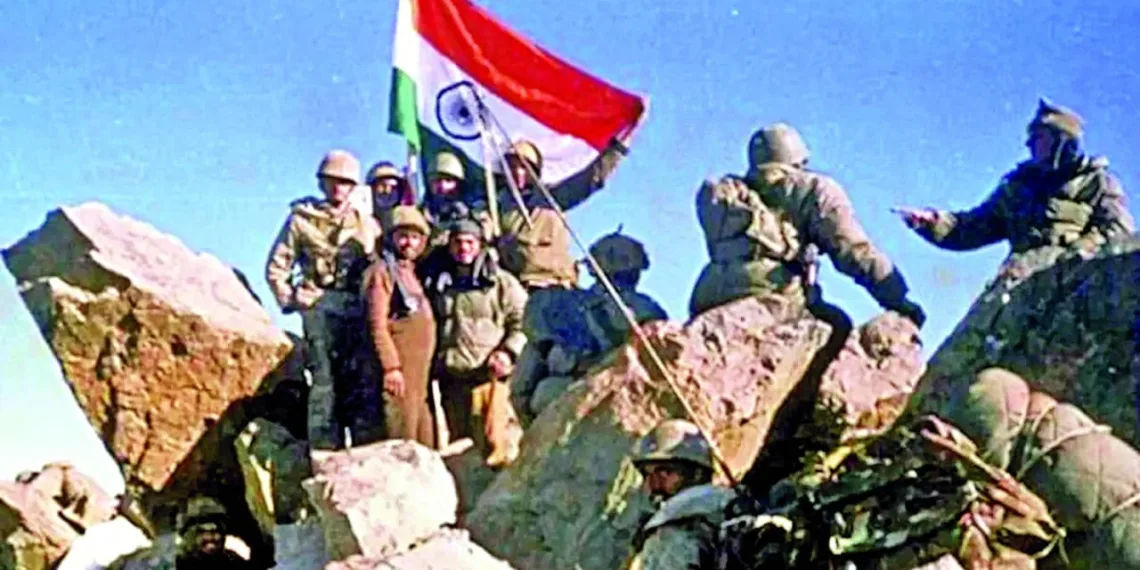
The Mushkoh Valley played a significant role in the Kargil War, showcasing both the strategic importance of the region and the resilience of Indian forces. The valley, along with Drass and Batalik, was one of the main areas of conflict where Indian troops faced challenging terrain and heavily fortified Pakistani positions.
The Mushkoh Valley was a crucial area during the Kargil conflict due to its proximity to National Highway 1, which was under direct observation and artillery fire from Pakistani positions on Point 4875. Capturing this peak was vital to secure the highway and disrupt enemy communication and supply lines. The battles were fought at altitudes above 16,000 feet. The terrain was characterised by steep slopes, narrow ridges, and extreme weather conditions, making it incredibly challenging to launch offensives and sustain operations.
The Indian Army’s resilience in the Mushkoh Valley during the Kargil War was exemplified by the fierce battles fought to reclaim strategic peaks and secure vital ground, particularly Point 4875. The recapture of Point 4875 was critical as it overlooked the National Highway 1, which connected Srinagar with Leh and was crucial for Indian supply lines and troop movement.
The 13th Jammu and Kashmir Rifles and, led by Lt Col Y K Joshi (later Lt Gen), played a crucial role in securing this peak. The terrain was challenging, with steep slopes and enemy positions well-entrenched, making the assault difficult. Bravery of Captain Vikram Batra and Rifleman Sanjay Kumar in neutralising enemy positions on the peak were instrumental in its capture. Point 4875 was successfully captured by July 7, marking a significant victory for the Indian Army and securing the highway from enemy observation.
Along with Point 4875, the Indian Army also displayed remarkable courage, determination, and selflessness in the face of enemy fire to recapture Tololing, Tiger Hill, and other strategic peaks and ridges in the Mushkoh Valley were crucial turning points in the war.
The Battle for Tiger Hill was a key engagement during the 1999 Kargil War. Tiger Hill, situated at a high altitude, provided a vantage point for monitoring the Srinagar-Leh highway and surrounding areas. The Indian Army launched a multi-pronged attack, with the 18th Grenadiers and 8th Sikh Regiment to dislodge the well-entrenched intruders.
The Indian Army successfully captured Tiger Hill on July 8th, marking a significant turning point in the Kargil War. Grenadier Yogendra Singh Yadav of the 18th Grenadiers was awarded the Param Vir Chakra for his bravery and actions during the battle.
The recapture of Tololing by Indian forces was the first major victory for India in the Kargil conflict and significantly boosted the morale of the Indian troops and the nation. The Pakistani forces aimed to cut off the link between Kashmir and Ladakh and force India to negotiate on Kashmir. The loss of Tololing hampered their ability to achieve these objectives.
The “Battle for Pimple Complex” in the Mushkoh Valley was another key engagement in the Kargil War, specifically involving the capture of Point 4875’s western slopes and the “Three Pimples” area. The Indian Army’s success in securing Pimple Complex played a crucial role in the eventual recapture of Tiger Hill and the Pakistani retreat. Capt Anuj Nayyar of the 17th Jat Regiment showed immense courage and indomitable spirit in face of enemy fire. He was awarded the Maha Vir Chakra (MVC) posthumously.
The battles in Mushkoh Valley demonstrated the resilience and determination of Indian soldiers in the face of challenging terrain and intense fighting. Securing the Valley from the Pakistani army paved the way for India’s eventual victory in the Kargil War.
(A renowned Defence Analyst, commentator & author, he hosts Defence Dynamics on DD India, contributes to top publications, and has covered European defence industries. A Sena Medal gallantry awardee, he led operations in Kashmir, commanded 9 Sikh Light Infantry, and studied at Army Public School Dhaula Kuan, Raja Ram Mohan Roy Academy Dehradun & Punjab University.)


